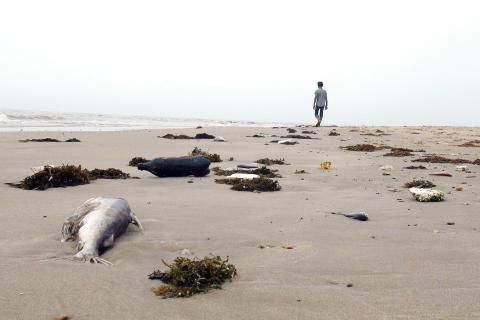Vietnam has told owners of a Taiwanese-built steel plant to dig up a controversial waste pipe, even after it found no evidence tying its discharge to mass fish deaths that have triggered health fears and public anger.
Huge numbers of dead fish have appeared at farms and on beaches in central Vietnam since April 6, affecting 200km of coastline, with no known cause of what the government is calling one of its worst-ever environmental disasters.
Vietnamese Minister of the Environment Tran Hong Ha declared illegal the waste pipe operated by Hung Nghiep Formosa Ha Tinh Corp, a unit of Formosa Plastics Group (台塑集團), after officials examined water samples around the site.

Photo: AFP
“We propose to have measures in place to monitor this system after it is elevated, for easy access and surveillance,” Ha told Formosa officials and reporters on Thursday.
Ha’s comments suggest the government still harbors doubts, despite tests that show Formosa, a major investor leading the US$10.6 billion steel project, was not behind the pollution.
Public outrage was also evident on social media, the only real channel through which Vietnamese get to vent in a country tightly controlled by the Vietnamese Communist Party.
In a statement yesterday, Ha said the government lacked experience in dealing with disasters and had been slow to act.
He called it a “very huge and serious environment disaster.”
The government has banned the sale and distribution of non-living aquatic products in four affected provinces.
Its probe said either toxic discharge caused by humans or “red tide,” when algae blooming at an abnormal rate produce toxins, may have killed the fish.
Facebook, which is used by about 30 million Vietnamese, is seeing an outpouring of anger directed at Formosa and criticism of the government’s sluggish response.
Many used the hashtag #toichonca, which means: “I choose fish.”
The hashtag emerged after a Taiwanese official at Formosa Ha Tinh said Vietnam had to choose between “catching fish and shrimp and building a modern steel industry.”
He later apologized.
In a government letter issued yesterday, Vietnamese Prime Minister Nguyen Xuan Phuc said authorities had yet to find the cause, and acknowledged public concerns.
Vietnam’s seafood exports, which totaled US$6.6 billion last year, will not be hurt, the industry’s body said. Top buyers are the US, Europe and Japan.
A petition on the White House Web site is urging US President Barack Obama to raise the issue with Vietnam’s leaders when he visits next month.

CHIP WAR: Tariffs on Taiwanese chips would prompt companies to move their factories, but not necessarily to the US, unleashing a ‘global cross-sector tariff war’ US President Donald Trump would “shoot himself in the foot” if he follows through on his recent pledge to impose higher tariffs on Taiwanese and other foreign semiconductors entering the US, analysts said. Trump’s plans to raise tariffs on chips manufactured in Taiwan to as high as 100 percent would backfire, macroeconomist Henry Wu (吳嘉隆) said. He would “shoot himself in the foot,” Wu said on Saturday, as such economic measures would lead Taiwanese chip suppliers to pass on additional costs to their US clients and consumers, and ultimately cause another wave of inflation. Trump has claimed that Taiwan took up to

A start-up in Mexico is trying to help get a handle on one coastal city’s plastic waste problem by converting it into gasoline, diesel and other fuels. With less than 10 percent of the world’s plastics being recycled, Petgas’ idea is that rather than letting discarded plastic become waste, it can become productive again as fuel. Petgas developed a machine in the port city of Boca del Rio that uses pyrolysis, a thermodynamic process that heats plastics in the absence of oxygen, breaking it down to produce gasoline, diesel, kerosene, paraffin and coke. Petgas chief technology officer Carlos Parraguirre Diaz said that in

Japan intends to closely monitor the impact on its currency of US President Donald Trump’s new tariffs and is worried about the international fallout from the trade imposts, Japanese Minister of Finance Katsunobu Kato said. “We need to carefully see how the exchange rate and other factors will be affected and what form US monetary policy will take in the future,” Kato said yesterday in an interview with Fuji Television. Japan is very concerned about how the tariffs might impact the global economy, he added. Kato spoke as nations and firms brace for potential repercussions after Trump unleashed the first salvo of

SUPPORT: The government said it would help firms deal with supply disruptions, after Trump signed orders imposing tariffs of 25 percent on imports from Canada and Mexico The government pledged to help companies with operations in Mexico, such as iPhone assembler Hon Hai Precision Industry Co (鴻海精密), also known as Foxconn Technology Group (富士康科技集團), shift production lines and investment if needed to deal with higher US tariffs. The Ministry of Economic Affairs yesterday announced measures to help local firms cope with the US tariff increases on Canada, Mexico, China and other potential areas. The ministry said that it would establish an investment and trade service center in the US to help Taiwanese firms assess the investment environment in different US states, plan supply chain relocation strategies and